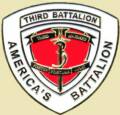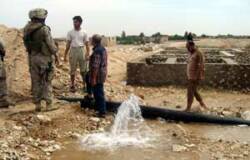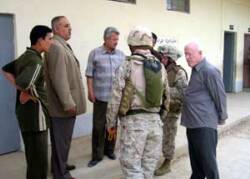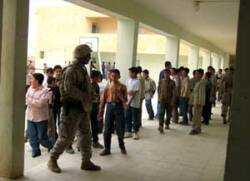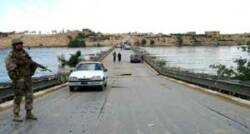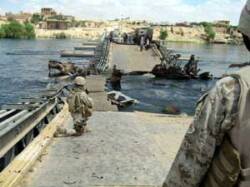The Most Rewarding Job'
Friday , May 05, 2006
(From: Fox news)
By Rick Leventhal
May 5, 2006
I met a lot of Marines on my recent embed, and I did my best to pass on the kind words so many of you have written.
Every chance I got, I thanked them for their service, and I reassured them that the folks back home appreciate what they're doing. You'll be happy to know none of them seemed surprised to hear it. They feel the support, and they're grateful for it.
I wish I'd had more time to spend with them, but we were moving around quite a bit, hopping from unit to unit, most from "America's Battalion," the 3rd Battalion 3rd Marines out of Oahu, Hawaii.
Even though the trip was short, it's clear some things never change. Marines are switched on. They're polite, but tough as nails. They like giving candy to the kids, but they're on guard and itching for the fight. Most important, the guys I spoke to all believe in what they're doing. They're proud of the progress being made, and remain dedicated to the mission of liberating Iraq from the insurgents and terrorists, while training the Iraqi security forces to take the lead so our troops can start coming home.
"This is the most rewarding job ever," one young Captain from Kilo Company told me during a Humvee ride across the Al Anbar desert.
"We planned the mission, we're executing the mission, we're working with the Iraqis, watching them grow and improve."
There's been no drop in morale, according to the captain, and others told me the same thing.
Sgt. Patrick Whalen, who suffered a concussion when a roadside bomb hit his vehicle, couldn't wait to get back to his unit after four days in the hospital. His gunner was badly hurt and his driver was killed.
"It's the fight we're fighting,” he told me. The attacks only increase his focus on getting the job done. The Iraqis, he said, "lack discipline and need more training, but they're coming along."
Most describe the Iraqis as brave and eager to learn. Staff Sgt. Steven White, on his second tour of Iraq, is learning Arabic, along with most of the other Marines in the battalion. There's still a language barrier, and it increases the challenge, but he's "very confident" about the future of Iraq.
The Regimental Commander of RCT-7, Colonel Blake Crowe says, "We're doing the right things." Three of his Marines were killed the night before we embedded. When I asked how he and his men stay focused, he told me, "We work hard not to get hard-hearted. The people are not the enemy, the enemy is hiding among the people."
May 3, 2006
The U.S. military is heavily focused on getting Iraq's security forces up to full strength. The thinking makes sense for Iraq, and for America. When the locals can handle the insurgents without our help, our troops can go home and this country won't fall apart.
Iraq is a big place, so there's lots of ground to cover and lots of towns and people to protect. The western Al Anbar province, for example, is the size of South Carolina, and is filled with medium and small cities and towns. The soldiers and Marines based here can't possibly protect them all, and neither can the Iraqi soldiers and police. There simply aren't enough of them to go around, at least not yet.
What often happens is soon after coalition forces clean up an area and move on, insurgents fill back behind them, terrorizing residents and using the town as a launch pad for attacks, which these days is almost exclusively roadside bombs. The Marines we were with are trying to clean up the trouble spots, but it's a tough job, and the terrorists have gotten pretty good at staying a step ahead.
The small town of Baghdadi has become a case study of sorts in locals taking charge. When Saddam's regime fell, Baghdadi's 30,000 residents were left with no police, no court, no judge, and no military presence.
Insurgents and criminals took advantage of the situation, and things grew increasingly dangerous, until one man had enough. Shaban Al Ubadi, who calls himself "Colonel Shaban," organized a couple hundred local men into a police force. They had no uniforms or official vehicles, and weren't recognized by the Iraqi government, but the Colonel didn't care. His goal was to stop the terror.
Soon, his ragtag team of cops started catching bad guys. With weapons and ammo supplied by the Colonel himself, the Baghdadi police rounded up dozens of suspected terrorists and turned them over to the Marines at the nearby Al Asad air base. The Colonel's men were inexperienced and young, some of them teenagers, and they weren't getting paid for their work, but they were brave and determined to protect their own.
The Marines were impressed by Colonel Shaban's spirit and performance, and decided to help. They provided weapons, helped get police vehicles, sent Shaban to Baghdad for additional training, and rallied the government for more assistance. They also moved a company of Marines into a forward operating base in town, setting up shop in an old Republican Guard theatre, bringing in Iraqi soldiers for training and additional security.
The Colonel clearly welcomes the help and appreciates his American partners, but he'd be go without if he had to. He's a charismatic guy and is passionate about his cause. He's also an even bigger target for terrorists, because he's so outspoken about defeating them. Colonel Shaban told me he's prepared to die to save his people. Let's hope that doesn't happen.


Note: This is not an official website. It's purpose is to support Marines of 3/3.
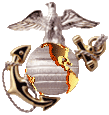
Progress steady, Marines meet with Iraqi leaders, discuss security in Haditha Triad region
Submitted by RLT 7
Story by Sgt Roe F. Seigle
HADITHA, Iraq (May 5, 2006) -- Since their arrival in the Al Anbar Province nearly two months ago, Marines here say Iraqi Security Forces are progressing toward relieving Coalition Forces and stabilizing the region.
In this rural region along the Euphrates River valley, the transition from U.S.-led to Iraqi-led military operations is well on its way, according to one U.S. Marine who has spent nearly two months mentoring Iraqi soldiers in this region.
But the atmosphere in this portion of western Al Anbar Province has changed since Saddam Hussein was removed from office in 2003.
Instead of daily fire fights against an armed, known enemy, similar to what Coalition Forces experienced during the push to Baghdad three years ago, U.S. Marines here are focusing on showing Iraqi soldiers and police how to spearhead security operations on their own.
“The progress I have seen the Iraqi Army make in the last few months makes me confident we can withdraw Coalition Forces from the area in the next six to eight months,” said Lt. Col. Owen Lovejoy, the senior advisor for the Military Transition Team, which supports and advises the Iraqi Army unit stationed here.
One example of that progress came earlier this month, when a joint-Iraqi and U.S. military operation near Baghdadi – a small town just south of Haditha – resulted in three detained insurgents.
Local police, Iraqi soldiers and a group of Marines from Weapons Company, 3rd Battalion, 3rd Marine Regiment spearheaded the joint operation – a “collaborative effort which led to results,” according to Maj. Eric W. Kelly, Weapons Company’s commanding officer.
Moreover, the operation highlighted the proficiency and cooperation between local police, Iraqi soldiers and Coalition Forces, he said.
“Iraqi soldiers and Marines are on a mission to ensure that the people of this area remain safe and that the insurgency has no room to thrive here,” said Kelly in an email response to questions. “The ‘Sons of Iraq’ take this goal quite seriously.”
So far, progress seems steady in the region. Iraqi Security Forces have conducted four operations on their own, reconstruction efforts are in the works to rebuild war-torn towns and villages, and local Iraqi leaders are meeting regularly to discuss and plan future efforts with the Marines.
Marine leaders say more than 30 insurgents have been captured, and three insurgent cells have been eliminated due to the combined efforts of Marines and Iraqi soldiers.
More importantly, security conditions seem to be improving in the Haditha Triad area along the upper western Euphrates Valley, as evidenced by a regular meeting of local city and tribal officials – a meeting which would not have been possible a year ago, according to Lt. Col. Norman Cooling, 3/3’s commanding officer.
Thanks to improving security conditions, such a meeting is now possible, according to Cooling. Six months ago, local Iraqi leaders were targeted by insurgents for cooperating with Coalition Forces, said Cooling, who also attended the meeting, which included more than a dozen sheiks, mayors, and other prominent local Iraqi leadership, to discuss security and reconstruction efforts in the area.
Now, local leaders can meet to discuss issues, which impact the progress of their towns and villages. The councilmen had no qualms about walking to the meeting with Coalition Forces in broad daylight, said Cooling.
“Since the councilmen agreed to meet with us, it proves they want to work with us and they believe we are interested in addressing their concerns,” said Cooling.
“The Marines have stabilized the security in the city,” said a local tribal leader after the meeting. “One year ago, a meeting like this would never take place because the criminal acts of insurgents would have prevented it.”
During the three-hour meeting, Iraqi councilmen expressed concerns such as potential reconstruction efforts of a footbridge destroyed during combat operations last year.
The footbridge connects the cities of Barwana and Haqlaniyah, both part of the Haditha “Triad,” and was one of several concerns local leaders discussed during the meeting. They said a refurbished bridge would bring stability to the local economy by providing a way for locals to transport goods between the two cities.
“The reconstruction of the footbridge is paramount to the lives of many businesses here,” said a councilman during the meeting. “A better economy means more jobs and less citizens turning to the insurgency for a source of income.”
Cooling also elicited support from the Haditha city council for the recruitment of Iraqi police in the area. He strongly stressed the importance of a police force being formed to continue the suppression of insurgency.
“The councilmen are considering supporting us in the police recruitment,” said Cooling. “Right now they want to see results from their requests and we are going to make sure they see them.”
Last year, police recruitment was attempted in the Haditha “Triad,” but insurgents threatened and intimidated anyone willing to be recruited, according to several Iraqi leaders at the meeting.
Cooling said the Iraqi leaders’ concerns would be addressed and plans would be made to rebuild the footbridge, as long as these meetings continue and the city councilmen consider supporting a recruitment drive for potential Iraqi police officers.
“We know the Marines are here to help the citizens of Haditha,” said a councilman after the meeting. “When they address our concerns and support our requests, the local people are going to notice this and in turn support them as well.”
The meeting also brought about talk of possible modifications to current security measures in the area. Both sides of the table agreed security measures were necessary to stop the flow of insurgents into the city, but the Iraqi said some of the measures, such as traffic control points, are an inconvenience to local residents.
Cooling said the issue would be addressed, but made no promises. Modifying the security measures could allow for an increase in insurgent activity, he said.
Though such meetings are a step in the right direction to improve security conditions in this volatile area of Al Anbar Province, both Iraqis and American leaders here say more work is needed before Coalition Forces can permanently leave the region, such as the recruitment, training and establishment of a local police force here and reconstruction of key components to local infrastructure.
The Marines say they will continue to work with local leadership to improve both security and quality of life for the Iraqi people.
“We will we show them through our actions we care about their concerns,” said Cooling.
Lt. Col. Norman L. Cooling, commanding officer for the Hawaii-based 3rd Battalion, 3rd Marine Regiment, discusses security and future reconstruction projects with more than a dozen sheiks, mayors, and other prominent local Iraqi leaders from the Haditha “Triad” region in Haditha, Iraq, April 24, 2006. Six months ago, local Iraqi leaders were targeted by insurgents for cooperating with Coalition Forces, but now, local leaders can meet to discuss issues which impact the progress of their towns and villages, said Cooling. Since their arrival in the Al Anbar Province nearly two months ago, Marines say progress is being made toward the transition from Coalition Forces to Iraqi Security Forces, which local Iraqi leaders say is crucial to stabilizing the area. “The Marines have stabilized the security in the city,” said a local tribal leader after the meeting. “One year ago, a meeting like this would never take place because the criminal acts of insurgents would have prevented it.” In just under two months, Marines and Iraqi Security Forces have captured more than 30 insurgents, and have eliminated three insurgent operations cells. Photo by: Sgt. Roe F. Seigle
More than a dozen sheiks, mayors, and other prominent local Iraqi leaders from the Haditha “Triad” in western Al Anbar Province, Iraq, met with U.S. Marines April 24, 2006, to discuss future security and reconstruction efforts in this Euphrates Valley region. Six months ago, local Iraqi leaders were targeted by insurgents for cooperating with Coalition Forces, but now, local leaders can meet to discuss issues which impact the progress of their towns and villages, said Cooling. Since their arrival in the Al Anbar Province nearly two months ago, Marines say progress is being made toward the transition from Coalition Forces to Iraqi Security Forces, which local Iraqi leaders say is crucial to stabilizing the area. “The Marines have stabilized the security in the city,” said a local tribal leader after the meeting. “One year ago, a meeting like this would never take place because the criminal acts of insurgents would have prevented it.” In just under two months, Marines and Iraqi Security Forces have captured more than 30 insurgents, and have eliminated three insurgent operations cells. Photo by: Sgt. Roe F. Seigle
Lt. Col. Norman L. Cooling, commanding officer for the Hawaii-based 3rd Battalion, 3rd Marine Regiment, shakes hands with a member of the Haditha City Council after a three- hour meeting with the Council – more than a dozen sheiks, mayors, and other prominent local Iraqi leaders from the Haditha “Triad” region – in Haditha, Iraq, April 24, 2006. Six months ago, local Iraqi leaders were targeted by insurgents for cooperating with Coalition Forces, but now, local leaders can meet to discuss issues which impact the progress of their towns and villages, said Cooling. Since their arrival in the Al Anbar Province nearly two months ago, Marines say progress is being made toward the transition from Coalition Forces to Iraqi Security Forces, which local Iraqi leaders say is crucial to stabilizing the area. “The Marines have stabilized the security in the city,” said a local tribal leader after the meeting. “One year ago, a meeting like this would never take place because the criminal acts of insurgents would have prevented it.” In just under two months, Marines and Iraqi Security Forces have captured more than 30 insurgents, and have eliminated three insurgent operations cells. Photo by: Sgt. Roe F. Seigle
Current and future security measures provided by Coalition and Iraqi military forces throughout the Haditha “Triad” was one of several topics local Iraqi leaders discussed during a Haditha City Council meeting April 24, 2006. More than a dozen sheiks, mayors, and other prominent local Iraqi leaders attended the three-hour meeting with U.S. Marines. “The Marines have stabilized the security in the city,” said a local tribal leader after the meeting. “One year ago, a meeting like this would never take place because the criminal acts of insurgents would have prevented it.” Here, a U.S. Marine from the Hawaii-based 3rd Battalion, 3rd Marine Regiment and an Iraqi soldier patrol the outskirts of Barwanah, Iraq – one of several rural towns which make up the “Triad” region in the upper Euphrates Valley – March 23, 2006. In just under two months, Marines and Iraqi Security Forces have captured more than 30 insurgents, and have eliminated three insurgent operations cells in this region. Photo by: Sgt. Roe F. Seigle
U.S. Marines and Iraqi soldiers search vehicles for explosives and weapons in Barwanah, Iraq, March 23, 2006. Since the arrival of the Hawaii-based 3rd Battalion, 3rd Marine Regiment in Iraq nearly two months ago, Marines and Iraqi Security Forces have captured more than 30 insurgents, and have eliminated three insurgent operations cells in the upper Euphrates Valley region. Current and future security measures provided by Coalition and Iraqi military forces throughout the “Triad” region was one of several topics local Iraqi leaders discussed during a Haditha City Council meeting April 24, 2006. More than a dozen sheiks, mayors, and other prominent local Iraqi leaders attended the three-hour meeting with U.S. Marines. “The Marines have stabilized the security in the city,” said a local tribal leader after the meeting. “One year ago, a meeting like this would never take place because the criminal acts of insurgents would have prevented it.” Photo by: Sgt. Roe F. Seigle

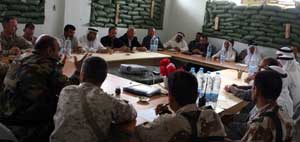
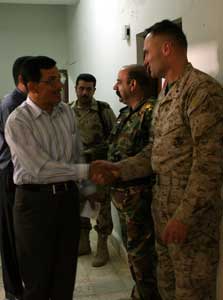
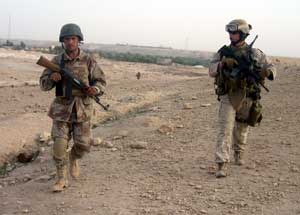
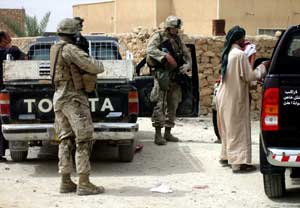
Marines work to improve living conditions, infrastructure in Iraq’s Haditha Triad region
Story by Sgt. Roe F. Seigle
HADITHA, Iraq (May 14, 2006) -- Maj. Chris K. Mace loves to hand out cash.
The 38-year-old leads a handful of Marines who spend their days rebuilding schools, hospitals and giving monetary reimbursement to Iraqis whose property has been damaged during three years worth of combat operations.
“We have made a lot of progress, but there is still a lot more to be made,” said Mace, a Pottstown, Pa., native who leads one of 17 civil affairs teams operating throughout Al Anbar province. “We are going to make as big an impact on the community as we can.”
So far, the U.S. has spent more than $230,000 in renovations and quality of life improvement projects, such as repairing schools and water pipes in the Haditha Triad area – a Euphrates River Valley-city with about 75,000 people, which is still considered by some as a hotbed of insurgent activity.
Detachment One of the Camp Pendleton, Calif.-based 3rd Civil Affairs Group, which is comprised of more than 30 Marines, works throughout Al Anbar Province with local government officials, sheikhs, mayors and other key leaders to identify and jumpstart various reconstruction and quality of life projects designed to rebuild damaged infrastructure in the region.
Notable progress in the region’s stability has made such civil affairs projects within the region possible, said Mace.
“As security and stability in the (area) increase, the willingness of the local populace to cooperate with us will as well,” said Mace.
The Iraqi Army and the Hawaii-based 3rd Battalion, 3rd Marine Regiment – the U.S. military unit assigned to this area of Iraq – have captured more than 30 insurgents and shut down three insurgent cells in the Triad area in the past two months, according to Marine leaders here.
Six months ago, insurgents would have intimidated and threatened any potential local contractors with death or kidnapping for cooperating with coalition forces, said Mace.
“Contractors especially are often afraid to work on projects we ask them to undertake,” said Mace.
But as security in the region continues to improve, so does the potential for progress for the Marines to freely work with local engineers and contractors to complete reconstruction and infrastructure projects, which also help fuel the local economy by providing jobs to local workers.
That, in turn, helps “honest and hardworking men” support their families, said Mace.
“It is going to take a long time and a lot of work to rebuild the Al Anbar province,” said Mace. “Until then, the Marines will continue to plan future projects and make as much of a positive impact as they can until they rotate back to the States.”
Most recently, Mace and his Marines went to several schools in the region and repaired doors and windows which were damaged by insurgents, said Mace.
A principal at one of the local elementary schools said the students were in dire need of basic school supplies such as paper, markers and pencils.
The Marines delivered with hundreds of pencils, markers, backpacks embroidered with cartoon characters, erasers and paper notebooks.
Staff Sgt. Omar Palaciosreal, a 32-year-old from San Bernardino, Calif., and a civil affairs team chief, says small projects such as delivering school and medical supplies can have just as much of an impact on local infrastructure as larger reconstruction projects.
“That school had nothing but a chalkboard in it and the teachers had to give lessons with only that commodity,” said Palaciosreal. “It was a sad sight and I believe we made it better.”
Before they arrived in Iraq more than six weeks ago, Mace and his Marines underwent extensive training on Arabic culture, language, religion and history – training which comes in handy when the Marines meet with Iraqi leadership to plan future projects, said Mace.
“Many of the local people are starting to realize the Marines are good people and are concerned with their wellbeing,” said an Iraqi interpreter assigned to work with Mace and his team of Marines. “The Marines have begun to build good rapport with the residents and this opens the door for us to communicate with them.”
Though coalition forces make every effort to minimize collateral damage in local towns and villages during military operations, some damage can occur, such as broken doors and damaged vehicles, said Sgt. Paul Flores, a 24-year-old from Los Angeles.
The money used to reimburse locals for such damages are more than just reparation payments, said Flores. When the civil affairs team visits locals to pay them, they can explain that the damages were not caused intentionally or maliciously – which often times means just as much as monetary reimbursement to locals, he said.
“Sometimes the fact we go to the individual and apologize to them for the damages means more to them than the money does,” said Flores.
With six months left before they rotate out of Iraq, Mace’s team of Marines will continue to work with local Iraqi leaders to improve quality of life and infrastructure within the Triad – which incorporates the cities of Haditha, Haqliniyah and Barwanah along the Euphrates River.
Future projects include repair of a local hospital, the restoration of the local phone system, a “trash for cash” type program, which encourages locals to clean-up their neighborhoods for money, and improvements to local drainage systems.
The Marines are also working to improve local communications by repairing the local telephone system, which was destroyed by insurgents so residents can not pass information about insurgent activity to coalition forces, said Mace.
According to Mace, these cleanups not only provide paying jobs to locals, but also prevent health risks that stem from bacteria generated from excessive garbage and stagnant water, which children are exposed to when they play in neighborhoods with such conditions.
“You earn a lot of credibility when you show residents you care about their well-being and their children,” said Palaciosreal.
Detachment One of the Camp Pendleton, Calif.-based 3rd Civil Affairs Group, which is comprised of more than 30 Marines, works throughout Al Anbar Province with local government officials, sheikhs, mayors and other key leaders to identify and jumpstart various reconstruction and quality of life projects designed to rebuild damaged infrastructure in the region. Led by Maj. Chris K. Mace, 38, and a native of Pottstown, Pa., the Marines have spent more than $230,000 dollars in the last three months to repair and reconstruct places such as schools and hospitals in the local area. Here, civil affairs Marines survey a broken water pipeline in Haditha, Iraq, with local contractors May 1, 2006. The pipeline was a source of clean water into many homes in the area until it broke. According to Mace, local contractors are hired when possible to complete the project, which in turn boosts the local economy. Photo by: Sgt. Roe F. Seigle
Detachment One of the Camp Pendleton, Calif.-based 3rd Civil Affairs Group, which is comprised of more than 30 Marines, works throughout Al Anbar Province with local government officials, sheikhs, mayors and other key leaders to identify and jumpstart various reconstruction and quality of life projects designed to rebuild damaged infrastructure in the region. Led by Maj. Chris K. Mace, 38, and a native of Pottstown, Pa., the Marines have spent more than $230,000 dollars in the last three months to repair and reconstruct places such as schools and hospitals in the local area. With the use of interpreters hired to assist Coalition Forces, Marines communicate with locals in Haditha, Iraq, May 1, 2006, to survey a broken water pipeline in the city. The Marines said they would have the line repaired. The pipeline was a source of clean water into many homes in the area until it broke. According to Mace, local contractors are hired when possible to complete the project, which in turn boosts the local economy. Photo by: Sgt. Roe F. Seigle
Detachment One of the Camp Pendleton, Calif.-based 3rd Civil Affairs Group, which is comprised of more than 30 Marines, works throughout Al Anbar Province with local government officials, sheikhs, mayors and other key leaders to identify and jumpstart various reconstruction and quality of life projects designed to rebuild damaged infrastructure in the region. Led by Maj. Chris K. Mace, 38, and a native of Pottstown, Pa., the Marines have spent more than $230,000 dollars in the last three months to repair and reconstruct places such as schools and hospitals in the local area. The Marines handed out pens, paper, markers and book bags to elementary school students May 1, 2006, in Haditha, Iraq. A principal at one of the local elementary schools said the students were in dire need of the supplies. “When the Marines donate these items and show kindness to these students, it makes a positive impact on their lives,” said the principal. “I believe it will keep them from supporting the insurgency when they are older.” Photo by: Sgt. Roe F. Seigle
A Marine from the Hawaii-based 3rd Battalion, 3rd Marine Regiment mans a traffic control point on a bridge near Haditha, Iraq, May 1, 2006. The bridge was repaired after Marines from Detachment One of the Camp Pendleton, Calif.-based 3rd Civil Affairs Group negotiated with local contractors and jumpstarted the reconstruction project. Many key structures, such as this bridge, were either destroyed by insurgents or during combat operations in the last three years that were vital to local businesses and private residents, according to Marines here. Detachment One, which is comprised of more than 30 Marines, works throughout Al Anbar Province with local government officials, sheikhs, mayors and other key leaders to identify and jumpstart various reconstruction and quality of life projects designed to rebuild damaged infrastructure in the region. Led by Maj. Chris K. Mace, 38, and a native of Pottstown, Pa., the Marines have spent more than $230,000 dollars in the last three months to repair and reconstruct places such as schools and hospitals in the local area. Photo by: Sgt. Roe F. Seigle
Marines survey a damaged bridge May 1, 2006, in Haditha, Iraq. Detachment One of the Camp Pendleton, Calif.-based 3rd Civil Affairs Group, which is comprised of more than 30 Marines, works throughout Al Anbar Province with local government officials, sheikhs, mayors and other key leaders to identify and jumpstart various reconstruction and quality of life projects designed to rebuild damaged infrastructure in the Haditha Triad region. Led by Maj. Chris K. Mace, 38, and a native of Pottstown, Pa., the Marines have spent more than $230,000 dollars in the last three months to repair and reconstruct places such as schools and hospitals in the local area. Photo by: Sgt. Roe F. Seigle
